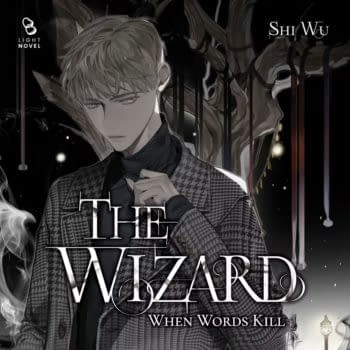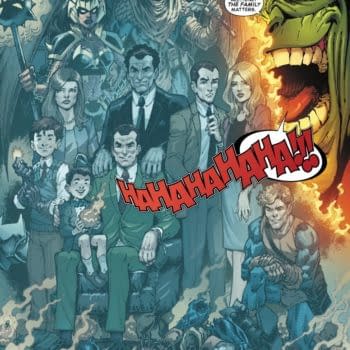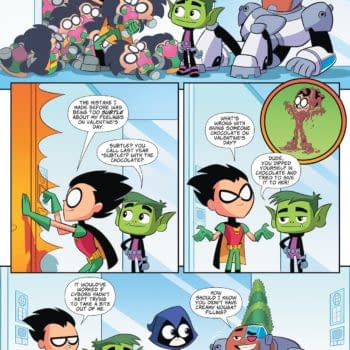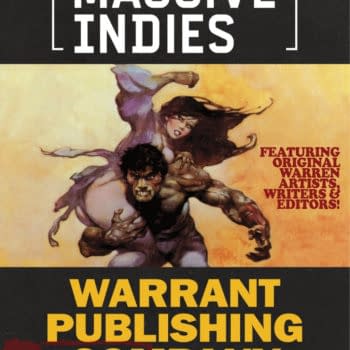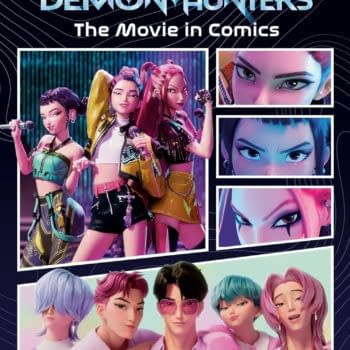Posted in: Comics, san diego comic con | Tagged: Avatarex, comic con, Comics, entertainment, grant morrison, Graphic India, san diego, san diego comic con, sdcc, sdcc '16, sdcc16
Grant Morrison, The Rockstar Of Comics At SDCC
By Mike Sangregorio

The company reaffirmed that it could not find a better champion than Morrison who continues work on the books "18 Days" and "Avatarex." Morrison's work, including "Aliens versus Dinosaurs" will be available via HumbleBundle at an affordable price. The proceeds of which will, in part, support the charities "Project: Water," "World Reader," and "Girls Who Code."
Morrison then reminded the audience that "myths are useful. They are the guiding light in life that explain the way the world works in a way that Donald Trump just doesn't." After this Morrison added that Trump probably "is a demonstration of how the world 'actually' works." The best example of this is the Mahabharata which is a type of Indian version of "The Odyssey," though Morrison was quick to point out that it is exponentially longer and thus "take that, Homer."

Traditionally a more Eastern philosophy, this embracing of a character's duality has not landed in the West as much in the past, those fanbases typically preferring characters defined by their roles. Morrison added that ever since 9-11 the West has moved more in this direction as realpolitik continues to intrude and people understand that they "all now live in the real world." As a result the 20th century idea of hero has been updated.
Just released in the US is, lead of the self-titled, "Avatarex," which grew out of Morrison saying that he reached the end of all he could say about western heroes. These previous characters had become "too tied to military industrial complex. Or, really, the military entertainment complex." Quick to point out that the only mainstream superhero story he will be doing for the foreseeable future is with Graphic India. Audience members were treated to free copies of the first issue of Avatarex, previously released on FCBD.

Asked to compare these new characters to the classic of the Justice League and the Avengers, Morrison remarked that while "the Justice League are the classic gods Jupiter and Pluto and 'whichever sea gods there are,' Marvel is more like witchcraft than mythology" with the movie versions of the latter characters deal both with 'good and evil' but also having fun with what they are doing and are less burdened by mythic weight. These characters deal less with "wagnerian music and grand scale" than they do with the real world.

Since Avatarex is the Indian version of Superman, hailing from an age before ours, the question asked is who is the opposite? Or "who is his Batman?" Morrison the detailed out the other members of what will hopefully become the primary team of heroes:
"Untouchable" – From the idea of caste systems in india. The people who would "sweep the streets" and who you would "not want their shadow to fall on you." He is the Batman, the ghost-man, to the team. Believed by the people that he is avatar of the God of death but he actually has "a much bigger secret to him." Avatarex deals with 'Big Ideas' on the level of Morrison's previous "All-Star Superman" while Untouchable deals with more real world, Batman-world stuff. He works in mumbai and will deal with the very real gang culture of the city there.
"Fearless" – Described as 'Spider-Manish' this young hero began his career after he was caught in a shootout with his brothers. Bullets tore his fear-center leaving him without fear of anything. He good at parkour and decides to become a "reckless, teenage hero styled after Hanuman the Hindu monkey god.

"Boss Train" – Constituted from a machine of the third age with technology far beyond ours.Disguised as "Thomas the Tank Engine with thermonuclear capacity" and a "giant transforming robot." A tribute to the place of railways in Indian culture. Kids who live near trains in slums form an "almost Scooby Doo type of relationship" with the character.
This will be the team that forms to take on the big threat to be built over the first season. Next up was the question and answer session.
Morrison said that what are traditionally understood to be "realistic superheroes" are absurd to him. Superheroes are not and cannot be real but that by helping these charities you actually can help a real human being in a practical way. He said that overall there seems to be "less violent crime then there was before and more education. The people in the third world are educated, things are trending the right way. You can marry if you're gay and we are moving in the right direction." He added that the key was not to "try to be messianic, just realize that if we all pitch in it will get better a little faster. We may not see Star Trek in our lifetimes but if we do good now then someday one of our children will fly that ship instead of trying to survive in bombed out nuclear wastelands with Donald Trump haircuts."

When asked how he would approach a character that had no chance at redemption he responded with his recent book "Nameless." Morrison admitted that character "had to be put down like a dog at the end" but that you cannot really kill superheroes. Asking the questioner for an example they cited Deadpool. Morrison responded by saying that "Deadpool has redemption! His humor is his redemption."
When asked if there was any chance of an animated adaption of "The Filth," Morrison informed us that while he would love to he has not been approached by anyone.
Another attendee is very excited for "All-Star Thomas the Tank Engine" to which Morrison responded that "there will be no redemption for him, all fossil fuels run out in the first arc!"

When asked which team that he had previously written he would most want to team with Avatarex, Morrison responded "probably the Invisibles… Untouchable is pretty much King Mob."

The panel ended with "The Rockstar of Comics" being escorted out as quickly as possible before the packed house could rush the stage.











